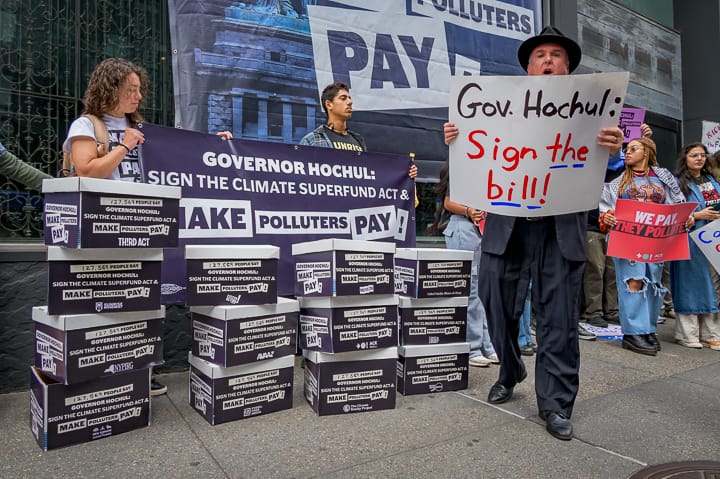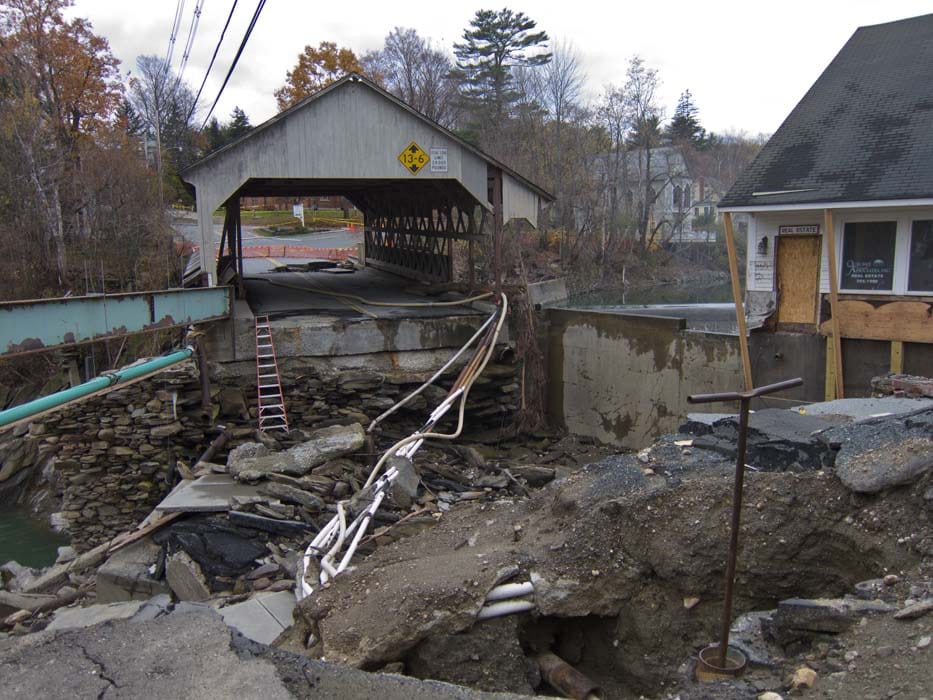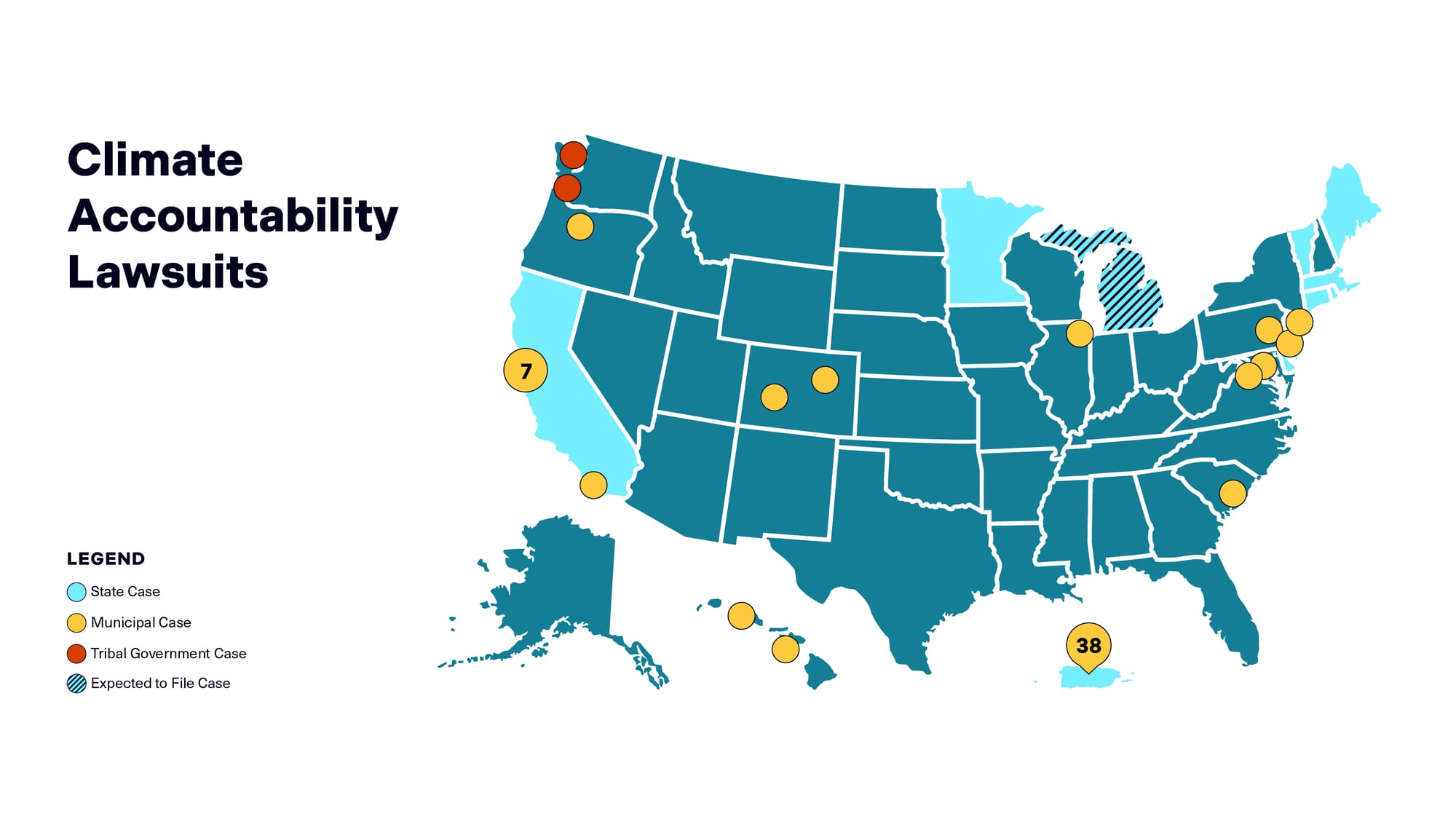‘Superfund’ laws aim to make Big Oil pay for climate damage
News laws to hold oil and gas responsible for costs associated with climate change provide ‘hope’ for activists — and a legal target for the industry

Published by VernonReporter
Climate activists and a few states are taking a new approach to hold the fossil fuel industry accountable for planet-warming greenhouse gasses: Fees to help pay for climate-related damage caused by stronger hurricanes, floods and wildfires.
In late December, New York Gov. Kathy Hochul signed her state’s Climate Change Superfund Law, which will require oil and gas companies to pay an estimated $75 billion over 25 years for climate change-related damages caused by their emissions. Hochul estimated state taxpayers shelled out $2.2 billion in 2023 to repair damage from and adapt to climate change.
New York is the second state to adopt what some legal experts say is a new approach to hold the oil and gas industry accountable. Legal challenges filed by states, municipalities and environmental groups have thus far been unsuccessful.
Under the New York law, companies that emitted one billion tons or more of greenhouse gases between 2000 and 2018 will be billed based on attribution science, which identifies how much human activities have contributed to extreme weather and climate-related conditions. Fossil fuel emissions are the leading cause of human-caused climate change. The law is set to take effect in 2026.
New York’s law will apply to any fossil fuel company deemed to have a “sufficient connection” to the state.
In May 2024, Vermont became the first state to adopt such a “superfund” law. And similar laws are up for consideration in Massachusetts, California and Maryland. Lawmakers in Minnesota and Oregon are crafting their own bills modeled after New York’s.
“These laws set a precedent and at least demonstrate a pathway for communities to take back control over their fate and destiny from the oil and gas companies,” said Jane Patton, fossil fuel campaign manager for the Center for International Environmental Law (CIEL). “I think that communities have for quite a long time felt very unempowered, intentionally marginalized, disregarded, frankly, gaslit. At least having some opportunity, some idea of how an accountability pathway could be drawn, is a beacon of hope.”

Industry sues to block superfund laws
Climate change superfund laws in New York and Vermont are already facing legal challenges at a time when President Donald Trump’s administration is rapidly reversing U.S. climate policy by freezing funding, placing federal workers on leave and removing climate references from government websites.
The U.S. Chamber of Commerce and American Petroleum Institute, the national trade association of the oil and gas industry, filed a lawsuit against Vermont. They charge the law is an overreach that seeks compensation from companies not even located in Vermont. The groups argue the federal Clean Air Act already gives the U.S. Environmental Protection Agency the authority to regulate air emissions.
West Virginia’s Attorney General John B. McCuskey is leading a lawsuit against New York making similar arguments on behalf of 22 states, all of them led by Republican attorneys general. It characterizes New York’s law as an “ugly example” of the “chaos that can result when states overreach.”
API’s spokesman Scott Lauermann referred questions to the U.S. Chamber of Commerce, which did not respond to requests for comment. Vermont’s Agency of Natural Resources directed questions to the Attorney General’s office, which also didn’t respond.
New York’s Department of Environmental Conservation said the agency does not comment on any potential or pending litigation.
At the time of its adoption, New York’s Superfund Law was heralded as a formidable state-level defense as President Donald Trump geared up to roll back federal environmental protections and climate change policy of the previous administration.
New York’s law is designed to put Big Oil on the hook for about $3 billion annually for the next 25 years based on scientific emissions data analysis between 2000 and 2018.
“They have to pay a certain amount. They have to pay a bill, basically,” said Cassidy DiPaola, a spokesman for the nonprofit Fossil Fuel Media and Make Polluters Pay.
Make Polluters Pay is the national campaign, launched by a coalition of state and national environmental advocacy groups, aimed at building up public support for climate litigation and legislation against fossil fuel companies.
“We're seeing the most momentum, the most enthusiasm and interest and actually real progress with the state level superfund bills,” DiPaola said.
The revenue the program generates will be used to upgrade New York’s aging infrastructure, on coastal restoration and stormwater drainage projects, installing energy efficient heating and cooling systems in public and private buildings and addressing climate-driven community health issues.
A summary of the bill stated that huge climate-related costs will soon hit the state: “Upgrading New York City's sewer system to deal with regularly-occurring large rain events is estimated to cost around $100 billion; a single project proposed by the Army Corps of Engineers to protect New York City from storm-driven flooding is estimated to cost $52 billion; (and) protecting Long Island from extreme weather is estimated to cost at least $75-$100 billion.”

Moving beyond climate lawsuits
Climate litigation against the oil and gas industry began in 2008 when the Native village and city of Kivalina, Alaska, sued multiple major oil and gas companies and utilities for the impacts of climate change on their barrier island. Residents there face relocation because a shrinking amount of sea ice leaves the island vulnerable to damage from increasingly severe storms.
The outcome of that case may not bode well for New York and Vermont.
In 2013, the U.S. Supreme Court decided not to hear the case after lower courts dismissed it. Those judges found the federal Clean Air Act already gives the federal government the authority to regulate greenhouse gas emissions — the same argument the plaintiffs in the legal challenges to New York and Vermont’s laws are making.
DiPaola said using state laws to achieve the same goal will be “difficult.”
“You'll see some industry arguments that they can't be held solely responsible for society's use of fossil fuels,” DiPaola said. “Just general questions against attribution science and whether specific damages are possible to be linked to specific emissions, which we know it is, but it is new science.”
Since the Kivalina case, a number of states and municipalities have filed accountability lawsuits against oil and gas companies for allegedly lying about the climate effects of their emissions. They are seeking compensation for the impacts they say burning fossil fuels has had on their communities — including sea level rise and extreme flooding.
The Center for Climate Integrity is tracking more than 30 cases. Corey Riday-White, the center’s managing attorney, says it will likely take years to be resolved, likening it to the litigation against tobacco companies.
“They don't want to be held accountable at all, and they are going to fight tooth and nail to avoid any sort of accountability — especially financial accountability,” Riday-White said. “So they're going to challenge those laws, just like they're going to defend the cases in court vigorously.”
Steven Feit, an attorney and legal researcher with CIEL, noted so far there are no U.S. cases in which the fossil fuel industry had to pay for damages associated with climate change. But he said there are some that could set new legal precedent.
As for the superfund laws, he said, “It's sort of a different way to cut the cake. The form that these (superfund) bills are taking is really about the impact to state budgets or municipal budgets.”
Floodlight is a nonprofit newsroom that investigates the powerful interests stalling climate action.


